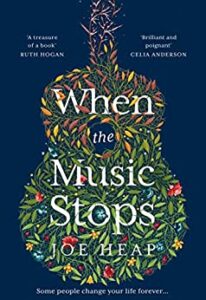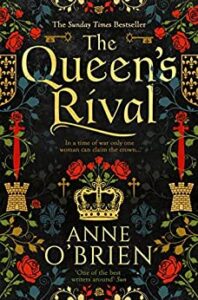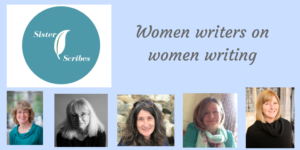The most incredible thing about Joe Heap’s When The Music Stops is the way it mixes the ordinary with the extraordinary. In one way it’s a version of David Nicholls’ One Day, but set over a longer period (the protagonists meet in childhood) and in the world of jazz music; the parts of the book that happen in the present day are very surreal indeed.
 The clever structure gives the book rhythm. It’s very much tied to the music, so rhythm seems like the right word. It makes for very long chapters (sections, really) but that’s fine, because I didn’t want to put it down. At first you wonder what’s happening in the present day but then it begins to make sense and you expect each section to have a certain chain of events. You even know what will happen in the end. But that’s comforting when the boundaries of your imagination are being stretched in other ways.
The clever structure gives the book rhythm. It’s very much tied to the music, so rhythm seems like the right word. It makes for very long chapters (sections, really) but that’s fine, because I didn’t want to put it down. At first you wonder what’s happening in the present day but then it begins to make sense and you expect each section to have a certain chain of events. You even know what will happen in the end. But that’s comforting when the boundaries of your imagination are being stretched in other ways.
The love story running through the book is compelling too and each decade incredibly well researched so you feel each period, rather than words being wasted describing it. Ella and Robert meet as children in pre-war Glasgow and have so many near misses you wonder if they will ever get together. I would have enjoyed it on its own, and have appreciated the quality of the writing, but adding the extra dimension makes this a standout book.
Kitty
Anne O’Brien – The Queen’s Rival
 I have long been fascinated with the Neville sisters and Cicely in particular so I was excited to read this book. Anne O’Brien is reliably one of my favourite writers of historical fiction and took the brave decision to write the story of Cecily through letters sent largely to family members but also to some of the major players in the turbulent story of her life, Margaret of Anjou for example, who literally held the life of Cecily’s family in her hands. This form must have been so hard to write but I really enjoyed it. It reinforced how hard life must have been without the immediacy of contact we are so used to nowadays. Writing letters to children and a husband that may or may not be alive or dead, knowing that your words could be the ones that help carry them to the scaffold. It reinforced the dangers and uncertainties of the times and all through the mouthpiece of a woman underrated for the role she and her family had to play in the development of Plantagenet England. Very well done.
I have long been fascinated with the Neville sisters and Cicely in particular so I was excited to read this book. Anne O’Brien is reliably one of my favourite writers of historical fiction and took the brave decision to write the story of Cecily through letters sent largely to family members but also to some of the major players in the turbulent story of her life, Margaret of Anjou for example, who literally held the life of Cecily’s family in her hands. This form must have been so hard to write but I really enjoyed it. It reinforced how hard life must have been without the immediacy of contact we are so used to nowadays. Writing letters to children and a husband that may or may not be alive or dead, knowing that your words could be the ones that help carry them to the scaffold. It reinforced the dangers and uncertainties of the times and all through the mouthpiece of a woman underrated for the role she and her family had to play in the development of Plantagenet England. Very well done.
Kirsten
What with publicity for Book One, final proofs of Book Two and starting to bash out the first draft of Book Three (and a fab new idea – I hope! – for Book Four) I haven’t had much time to read this month. But one book I have finished and really enjoyed is People Like Us by Louise Fein. This is the coming of age story – I’ve learned this month that this this can be called a Bildungsroman – of Hetty who is brought up in a Nazi household in Leipzig in the years building up to the second war and who falls in love with a Jewish boy. It’s beautifully written and is – by turns – fascinating, poignant and heart-breaking with, I think, a lesson for the times we find ourselves in today. Highly recommended.
Interestingly, I’ve just been sent an ARC of a love story set in lockdown. It’s the first story I’ll have read with Covid-19 as a backdrop and I’m not sure how I feel about reading it. Having had quite a difficult year personally, the jury is out on whether it just too soon to read a story set in the time of Covid. I’ll keep you posted.

